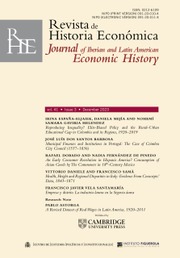Article contents
RECONSIDERING THE SOUTHERN EUROPEAN MODEL: MARITAL STATUS, WOMEN'S WORK AND LABOUR RELATIONS IN MID-EIGHTEENTH-CENTURY PORTUGAL
Published online by Cambridge University Press: 10 January 2020
Abstract
Challenging current ideas in mainstream scholarship on differences between female labour force participation in southern and north-western Europe and their impact on economic development, this article shows that in Portugal, neither marriage nor widowhood prevented women from participating in the labour market of mid-eighteenth-century. Our research demonstrates that marriage provided women with the resources they needed to work in various capacities in all economic sectors.
This article also argues that single Portuguese women had an incentive to work and did so mostly as wage earners. Finally, the comparison of our dataset on female occupations from tax records with other European cases calls for a revision of the literature and the development of a more nuanced picture of the north-south divide.
Resumen
Desafiando la historiografía actual sobre las diferencias entre la participación femenina en los mercados laborales del noroeste y del sur de Europa y su impacto en el desarrollo económico, este artículo muestra que ni el matrimonio ni la viudez impidieron las mujeres de participaren en la economía portuguesa de mediados del XVIII. El matrimonio proporcionó a las mujeres los recursos necesarios para trabajar en en diversas capacidades.
Este artículo sostiene también que las solteras tenían un incentivo para trabajar, y lo hacían como asalariadas. Finalmente, la comparación de nuestros datos de ocupaciones femeninas con otros casos europeos muestra que la literatura requiere una revisión y el desarrollo de una imagen más matizada de la división norte-sur.
Keywords
Information
- Type
- Articles/Artículos
- Information
- Copyright
- Copyright © Instituto Figuerola, Universidad Carlos III de Madrid, 2020
Footnotes
Research Department, International Institute of Social History – Royal Netherlands Academy of Arts and Sciences, Amsterdam, Netherlands. filipa.ribeirodasilva@iisg.nl
CIDEHUS: Interdisciplinary Centre for History, Culture and Societies, Évora, Portugal. helderfmcarvalhal@gmail.com
References
REFERENCES
Ribeiro da Silva and Carvalhal supplementary material
Ribeiro da Silva and Carvalhal supplementary material 1
Ribeiro da Silva and Carvalhal supplementary material
Ribeiro da Silva and Carvalhal supplementary material 2
- 3
- Cited by

